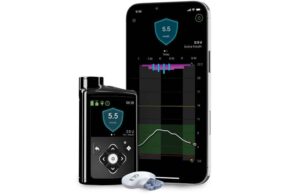
Additionally, CEO Geoff Martha offered some insights into the Diabetes unit’s product pipeline during the Goldman Sachs global healthcare conference. Medtronic’s diabetes pipeline includes a next-generation continuous glucose monitor (CGM) sensor that is half the size of the company’s present sensor.
The medtech giant announced that it received FDA approval for MiniMed 780G with the Guardian 4 sensor in April. Medtronic’s new artificial pancreas system offers meal detection technology. It provides automatic adjustments and corrections to sugar levels every five minutes. This occurs for both basal (background) and bolus (mealtime) insulin needs.
Company officials called it a “monumental improvement” on existing diabetes offerings at Medtronic. Shortly after confirming the shipments, Martha took questions at the Goldman Sachs conference. Among many things, Martha touched on the direction of Medtronic’s Diabetes unit.
That unit has had an eventful first half of 2023. Shortly after receiving the MiniMed approval, the company confirmed a full resolution for its FDA warning letter. In December 2021, the FDA had issued a warning letter to Medtronic’s Northridge, California, Diabetes headquarters. The company took proactive actions to continue to strengthen its quality systems.
Not long after resolving the letter, Medtronic received another regulatory boost in Canada. The country’s regulatory body licensed the use of the next-generation Guardian 4 CGM sensor with MiniMed 780G. Canadian officials previously approved the MiniMed 780G pump in November 2022. Medtronic plans to launch the system there by the end of 2023.
Late last month, the company announced an agreement to acquire insulin delivery technology developer EOFlow. Medtronic plans to add EOFlow’s tubeless, wearable and fully disposable insulin delivery offerings to its existing diabetes portfolio.
Here’s a summary of Martha’s comments around the Medtronic Diabetes business.
How Medtronic plans to win customers back
Goldman Sachs’ Jamie Perse asked Martha how, amid a “frustrating environment for customers” with all that’s gone on for Medtronic Diabetes over the past couple of years, the company wins customers back.
Martha pointed to clinical outcomes as a driving factor behind that effort.
“I talked to a long-time endocrinologist who, quite frankly, has not been a big fan of Medtronic over the last couple of years,” Martha said. “She literally was crying on the phone with me. She could not believe the impact 780G — in a good way — was having on patients.”
He pointed to the system’s standalone CGM and the elimination of fingerstick requirements as a growth driver in the market. Martha also said Medtronic’s focus centers around automated insulin delivery, with time in range representing a major point of interest. He said Medtronic believes its algorithm produces “the best time in range,” producing better results than initially anticipated.
Bringing all this to the U.S. should provide a boost for the business, he concluded.
“People point out to me that maybe the U.S. is more competitive,” Martha said. “I’m not sure. [In] Europe, we feel like all the competition is there as well. We’re very confident the business is going to get back to that double-digit growth.”
Where is the next-gen CGM pipeline headed?
On a November 2021 earnings call, Martha touched on the company’s next-generation Simplera disposable CGM sensor. Half the size of the Guardian 4, Simplera could theoretically be Medtronic’s counter to the existing CGMs on the market made by the likes of Abbott and Dexcom.
When asked about this CGM at Goldman Sachs, Martha confirmed that the company made its regulatory submissions recently. Medtronic applied for CE mark “months ago” and submitted for FDA approval within the last month or so, he said. Martha offered no timeline for the approvals but expects Simplera to hit European markets sometime in the fall.
“It is half the size of our current sensor, and it takes two seconds to put on,” he said. “I actually went through our clinical trial, nondiabetic. But I wanted to see, and it’s very easy to use. We think that’s coming soon. And it’ll have an even bigger impact.”
Despite the advancements on the CGM front, Martha said, from an economic standpoint, Medtronic makes its money in the automated insulin delivery business with the consumables.
Perse questioned if Medtronic could potentially make inroads with Simplera as a standalone offering, but Martha rejected that notion — at least for the time being.
“We’re not counting on that,” he declared. “I always want to be transparent. We think, maybe not this generation, but the next one after that would be more competitive.”

